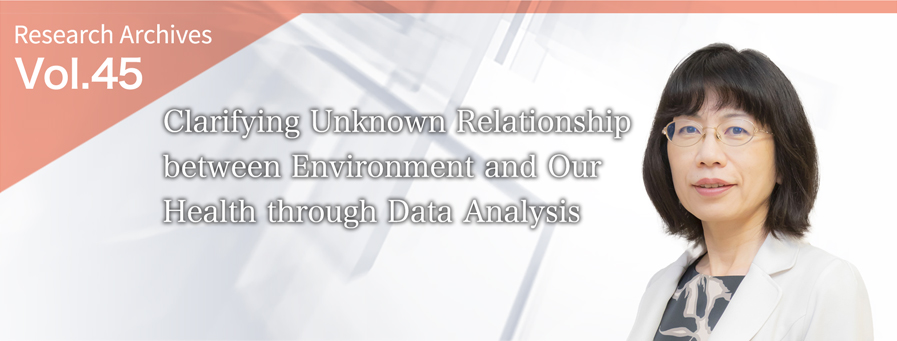
Department of Hygiene, Graduate School of Medicine, Hokkaido University
Kayo Ueda M.D., Ph.D.Social
Medicine
Academic & Professional Experience
- 1994 Graduated from Faculty of Medicine, Hokkaido University
- 1994 Resident, Osaka University Hospital"
- 1995 Resident, Yodogawa Christian Hospital
- 1997 Clinical Fellow, Yamaguchi University Hospital
- 2002 Attending Doctor, Ogori Daiichi Hospital,
- 2006 Assistant Professor, Yamaguchi University Graduate School of Medicine
- 2008 Researcher, National Institute for Environmental Studies
- 2014 Associate Professor, Graduate School of Engineering, Kyoto University
- 2021 Professor, Graduate School of Medicine, Hokkaido University
Studies on transboundary air pollution and its health effects
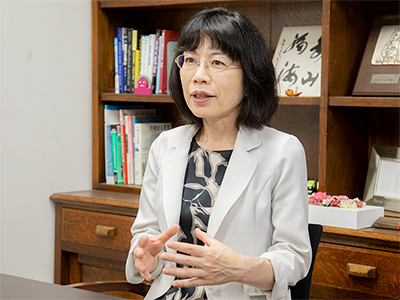
The Department of Hygiene was established in 1926 and the wide range of research conducted here includes infectious disease prevention, its treatment and environmental hygiene. In recent years, Professor Hiroshi Nishiura, the sixth professor of the department, has been engaged in epidemiological research on infectious diseases using mathematical models, and has recently received national and international acclaim for his achievements concerning COVID-19.
Professor Kayo Ueda, who succeeded Professor Nishiura to become the seventh professor of the department, has been engaged in research on environmental health and environmental epidemiology after her clinical practice as an internist.
“In clinical practice, questions about disease occurrence came up to me. The questions and hypotheses I had at the time led me to my current research,” Professor Ueda says, “For example, if there is a higher incidence of disease in a specific region, it raises suspicions of some regional factors. When regional characteristics or environmental causes are considered, a wider range of environmental data must be verified, sometimes using global meteorological and atmospheric environmental information, including satellite imaging.”
Currently, the department is engaged in research on environmental epidemiology and health and welfare for the elderly. Among these, environmental epidemiology research in low- and middle-income countries (developing countries) also involves analysis of air quality deterioration and its impact on health in Asia with a rapid economic development.
Professor Ueda says, “In Europe, the United States, and Japan, has tackled air pollution long time to improve air quality. So currently, air pollution problems are viewed as so-called “solved environmental pollution”. However, in Asian countries, air pollution has become serious issues for these 10 years like other environmental pollution.”
In Southeast Asia, emissions from factories and vehicles have become a problem in highly urbanized areas, while transboundary air pollution, namely, smoke from slash-and-burn agriculture and combustion of agricultural waste (rice straw after harvest) that spreads to neighboring countries and regions, has become a major problem in rural areas. In 2022, Professor Ueda’s research group conducted a study on the association between air pollution caused by vegetation fires in northern Thailand and the increase in respiratory diseases among local residents. They could quantitatively prove that an environmental policy banning vegetation fires is effective in reducing respiratory diseases[1].
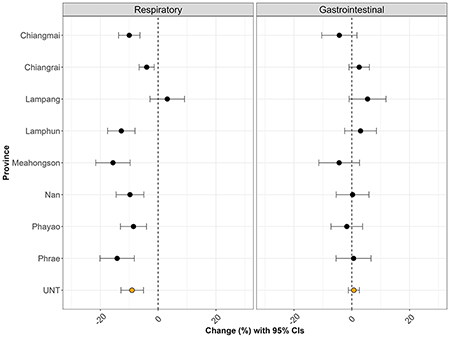
Elucidating the impact of climate change on public human
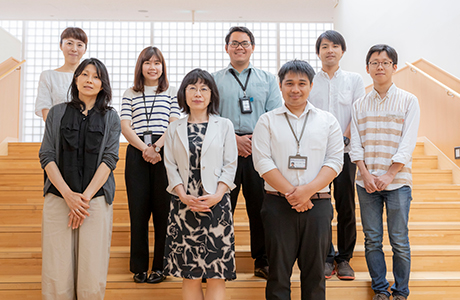
In recent years, the department has been focusing on research on the health effects caused by climate change. Heatstroke under extremely hot summer conditions is a typical example of the health effects of climate change, but cardiovascular and respiratory diseases are also attracting attention. It is also believed that flooding caused by typhoons and heavy rains increases the number of gastroenteritis patients. Professor Ueda’s research group has clarified the relationship between these phenomena through statistical analysis of data.
Professor Ueda says, “We analyzed the number of ambulance dispatches and the types of diseases of patients transported on days with extremely high temperatures and found an increase in the occurrence and exacerbation of not only heatstroke but also cardiovascular, respiratory, and other diseases, resulting in an increase in cases of emergency transport.”
It was also found that on days with higher temperatures, there is an increase in self- injuries (accidents in which people intentionally inflict injury on themselves) and assaults (accidents in which injury is intentionally inflicted by others), as well as medical illnesses.
Professor Ueda says, “It has been found that extreme weather events and disasters associated with climate change have a significant impact on human health, causing medical illnesses and self-inflicted injuries in addition to heatstroke. I’d like everybody to know that this is not only a global environmental issue, but that it can have a direct impact on your own body and mind.”
Another research topic is the health effects of PM2.5 components, particles with a diameter less than 2.5 μm (1 μm is 1/1,000 of 1 mm) suspended in the air. There are a number of studies examining the health effects of PM2.5 using the mass concentration. However, PM2.5 is a mixed substance composed of multiple components (carbon components, ionic components such as sulfate and nitrate ions, and inorganic elemental components such as iron and aluminum), and the health effects of specific components remains unknown. The department participated in joint epidemiological research with the National Institute for Environmental Studies and other organizations on specific components of PM2.5 and their health effects using emergency transport as an indicator[2].
Research is also being conducted on the health effects of particles that are even smaller than PM2.5, known as ultrafine particles (UPFs). Professor Ueda says, “There is concern that UFPs may affect not only the respiratory tract, but also the circulatory and central nervous systems. However, UFPs are not regulated because their details and distribution concentrations in Japan are unknown. There are many unknowns regarding their effects on the human body, so we are in the process of collecting and analyzing data.”
There are many researchers from overseas in this department, and research activities are conducted in a global environment. In addition to the above-mentioned research themes, the department is also involved in epidemiological studies on health and welfare of elderly people as part of our research on the social environment and its health effects to clarify the relationship between social interactions and the behavioral and psychological symptoms of dementia (BPSD) among elderly people with dementia residing in nursing homes. Both graduate and undergraduate students focus on improving their skills related to data analysis and learn research techniques through practical sessions using R statistical software and research progress meetings.
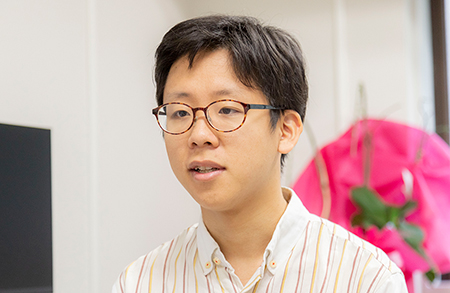
[2] ^ A Case-Crossover Analysis of the Association between Exposure to Total PM2.5 and its Chemical Components and Emergency Ambulance Dispatches in Tokyo
(Interviewed in August 2023)
Improving skills by learning to use statistical software and giving presentations in English
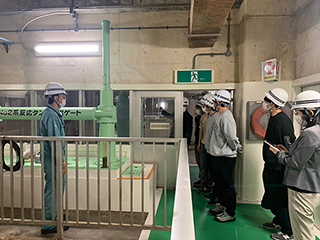
In addition to practical sessions using R statistical software, the department offers intensive training on data handling and statistical analysis using R for beginners, including exercises and lectures.
It also offers online joint seminars with the University of Tokyo and Nagasaki University. Participants, many of whom are international students, give presentations in English and engage in question-and-answer sessions with researchers in environmental epidemiology who are active in Japan and elsewhere. Students learn how to give presentations and conduct question-and-answer sessions. They also have opportunities to practice giving presentations at academic meetings abroad.


